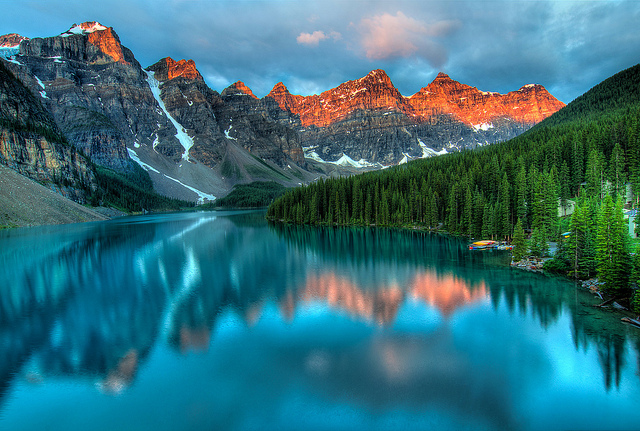Packing for a Canadian Wilderness Hike
A hiking trip can be the high point of a lifetime. You stand to enjoy improved levels of physical fitness, as well as a sense of pride and accomplishment on completing your hike. Canada is home to some of the world’s best hiking, with endless miles of diverse and stunning wilderness easily accessed by a wealth of hiking trails.

Moraine Lake by James Wheeler on Flickr.
Use it or lose it
Packing for a Canadian hiking trip involves much more careful consideration than packing for your average holiday abroad. You will need to carry everything you pack, every step of the way. Any unnecessary items must be left at home; if you bring them, you will end up throwing them out. A hiking trip is not the place for luxury or fashion. Packing for hiking must be about brutal practicality. Try to keep the total weight of your pack to 9kg or less.
Your backpack
Although you want something lightweight, it has to be sturdy and ergonomically designed. Ensure you choose a pack with an internal or external frame and hip strap for balanced weight distribution. Straps should be adjusted so that most of the weight rests on your hips with the backpack leaning outwards away from your shoulders. 50 to 65 litres is the optimum capacity.
A place to rest your head
When you have chosen a backpack, you will need to pick out a form of shelter and a sleeping bag. Most people will choose a tent for shelter. It is worth paying more for a specially designed lightweight tent. Another option that saves on room and weight is a tarpaulin, which can be strung up between trees in myriad ways to create basic shelter. Tarps are easy to carry but inevitably leave you exposed to the elements (and wildlife). Roll mats will be necessary to minimise the discomfort of sleeping on the floor. Sleeping bags should be as lightweight and compressible as possible, with duck down making the best choice of stuffing. Make sure your sleeping bag is designed for the temperatures you will be likely to experience.
Clothing
You are going to be working hard, so lightweight breathable clothing is essential. Fashion is not important but it is well worth considering performance-enhancing or recovery facilitating clothing such as copper compression garments. These types of workout tops and trousers are worn by sponsored athletes to help them both perform better on the day and to recover quickly after exertion. The benefits will be felt by everyone.
Food and water
Take bottles that carry at least two litres of water, and three litres if hiking in summer months. Water purification tablets or filters are essential as you will need to refill your bottles daily from streams. Take a cooking pot as campfires can get out of hand unless you are experienced in wilderness skills. Ready-to-eat food that will not go off is essential; avoid canned food due to the weight. Opt for energy bars, protein bars, cold-pressed fruit bars, and dehydrated food that can be cooked with water.
Other essentials include a map, compass, whistle, knife, torch and first aid kit. With all this in your bag (and no more), you will be set to enjoy the experience of a lifetime in the beautiful Canadian wilderness.
Moraine Lake by James Wheeler on Flickr.




